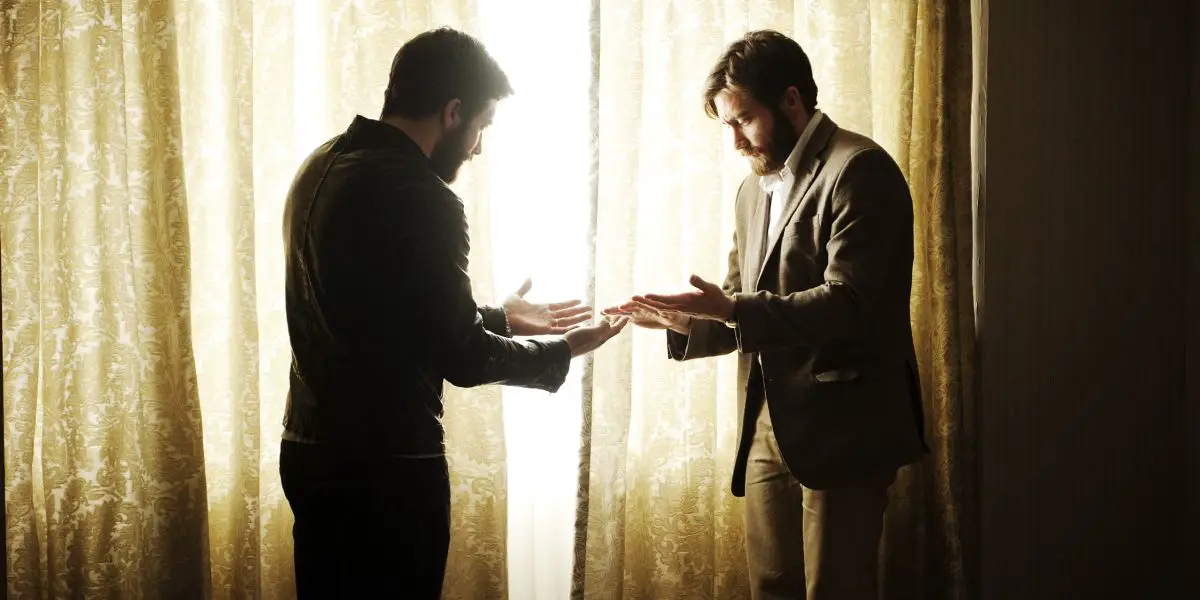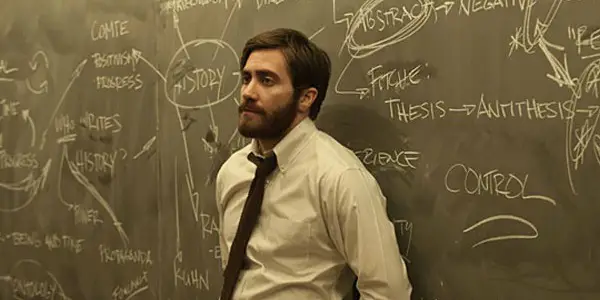ENEMY is Denis Villeneuve’s Beautiful, Twisted Mind-Bender

Jay is just a dude who takes in an unhealthy…
Last year, Denis Villeneuve directed one of the most pleasant surprises of the year with Prisoners, an unrelentingly tense film about child abduction that presented intriguing moral questions while also providing satisfying twists and turns throughout. That filmed starred Hugh Jackman and Jake Gyllenhaal. Gyllenhaal has teamed up with Villeneuve again in Enemy, a much smaller and much, much more mind-bending film than Prisoners. The film revolves around Jake Gyllenhaal’s character, Adam Bell, and… Jake Gyllenhaal’s other character, Anthony Claire.
Adam Bell is a history professor who seems disinterested in his job, his girlfriend, and life in general. At the recommendation of one of his co-workers, he rents a local film called Where There’s a Will There’s a Way to attempt to cheer himself up. In the film, Adam sees an actor in a bit role that looks exactly (and I mean exactly) like him. This is where Gyllenhaal’s second character comes into play. Adam goes to great lengths to find his doppelgänger, stalking Anthony and consistently calling his home in an effort to convince him of the extraordinary situation. The film plays out like a surreal fever dream, but it is also so much more. Woven into the film’s narrative puzzle are rich themes, very strong dialogue, great performances, and an attention to detail that begs for multiple viewings.

Details, Details, Details
The distinction between good filmmaking and bad filmmaking can often be attributed to the specificity of a director’s vision. In Enemy, Villeneuve makes use of every inch of the screen at all times. Symbols that are seen only on the edges of shots are carefully placed to give subtle hints to both the narrative and the film’s underlying themes. Make sure to keep an eye out for anything spider-related (webs, limbs, etc.).
There is one particular instance where this detail shines through. When Adam is in his classroom standing in front of a chalkboard, there is a web (wink, wink) of ideas sprawled on the chalkboard. At this point in the film, Adam is at his most disillusioned and the ideas on the board all relate to chaos and control as they relate to totalitarianism, which is a major theme throughout the film. The chalkboard is never referenced, it merely sits in the background for keen-eyed viewers to look at and appreciate. This subtlety helps make Enemy an intricate, intelligent film.
Talent Behind the Camera
In lesser hands, Enemy could have been an overly pretentious mess, but there is an abundance of talent here that squeezes every ounce from the amazing potential of the format of a film like this. It is a bold film because it is so abstract, high-concept, dark, moody, and sensual, but it manages to all come together to create one of the more interesting movie-going experiences of the year. As I mentioned earlier, Villeneuve does a great job of leaving no stone upturned visually and this is taken a step further thanks to excellent cinematography of Nicolas Bolduc.
Bolduc does a phenomenal job of using light to convey mood, as many cinematographers do, but he also uses light as a characterization tool. In a film that finishes in a swift 90-minutes, it is important to use everything at your disposal to develop characters. And here, framing and lighting effectively does that. There are some beautiful shots where Bolduc only shows the exact amount of light that he wants to. Whereas most films tend to create dark shadows on a white canvas, the canvas in Enemy is often black and must be lit ever so slightly to barely make out the person or thing presented, often perfectly centered on screen. The mystery of the film’s narrative extends through the lighting. There are also some wonderful overhead shots of the city that make the various buildings look like their own intricate geometric puzzles, again affirming the complexity and unknown of Adam and Anthony’s situation.
And Talent in Front
There is no way to talk about Enemy without talking about Jake Gyllenhaal‘s phenomenal performance. But while most people will proclaim that he has morphed into a great actor in recent years, I would argue that he has always been very strong, especially in darker roles like this one. Beginning with 2001’s bizarre cult classic, Donnie Darko, Gyllenhaal has put on great performances in moody films like Zodiac and Source Code, and he was also the best actor in Prisoners last year.
Here, he is tasked with playing two characters that the audience must be able to distinguish at all times. This is made doubly difficult because both characters each have very, very similar full beards. This was an interesting choice that, at times, can make it a tad difficult to determine who is who, but for the most part Gyllenhaal is able to communicate this through body language alone. The paranoid, unhappy Adam seems like a completely different person than the confident father-to-be, Anthony, and this can be attributed to Gyllenhaal alone. In a role that requires nuance in ways that very few other roles do, Gyllenhaal shines. So while most of the characters in the film often mistake one for the other, Gyllenhaal‘s performance and small details from Villeneuve leaves the task of figuring out who’s who easier than you would think. Meanwhile, there isn’t much for the other actors and, specifically, actresses to do, but Gyllenhaal‘s performance is so good it’s a little hard to notice.

Too Subtle for Its Own Good?
Ambiguity can be one of the most powerful and though-provoking tools in film, but it is a tightrope walk that requires a healthy balance of direct and indirect communication. A few times in Enemy, the indirect stacks up and the plot becomes a tad muddled. Characters are unclear at times, as are their motivations. But besides these rare instances, Enemy’s ambiguous nature is one of its strong suites. There are images in the film that will leave you scratching your head at first, but in the end they will all connect back to one unifying idea.
Studies in Arachnophobia
Very early in Enemy, the screen goes black but for the words, “Chaos is order yet undeciphered”. This sentence sums up Enemy perfectly. On the surface it is a gimmicky movie filled with very strange moments, a fast-moving plot, and a bizarre ending. Just before this excerpt from Jose Saramogo’s novel, The Double (on which the film is based), we see a scene in a bizarre sex club where we are introduced to the film’s most important symbol: the spider. It is the spider that takes the narrative to new, allegorical heights. It is an analysis of totalitarianism and the many forms it can take. The greatest tool these absolute rulers have is distraction, and there is plenty for Adam in this film.
Adams’ history lessons throughout the film focus on totalitarian governments both in history and in the modern world. He explains that these totalitarians use many methods to maintain control over their constituents and explaining that this is human nature’s pattern using quotes from philosophers like Karl Marx. The bizarre ending of this film illustrates that this totalitarianism still exists today and that most people merely shrug their shoulders, accept it, and move on. There is a level of complacency towards this horror. This horror is mirrored in the shocking and horrifying final 10 seconds of the film, which is so surprising it cannot be mentioned in this review. While at first it seems random and nonsensical, it actually reverts back to the very first scene of the film and provides the beginning of a puzzle that must be worked backwards to solve. It is a thinking man’s film, and that is incredibly refreshing.

Conclusion
Featuring a tremendous performance from Jake Gyllenhaal, bold direction from Denis Villeneuve, and fantastic cinematography, Enemy is a masterfully crafted film with a tricky but very fulfilling premise. While at times it may be unclear what is really happening (reality is something that can be debated as it relates to this film) and why it is happening, the big picture elements of the film’s most important abstract ideas are right under the viewer’s nose, but it is up to them to decipher the complexities of the film, which is an endeavor worth taking on. The film is sure to create a lot of dialogue, which is what a great film does. And this is a pretty darn great film.
What did you think of the ending? Do you enjoy a certain level of ambiguity in film? Let us know below!
Does content like this matter to you?
Become a Member and support film journalism. Unlock access to all of Film Inquiry`s great articles. Join a community of like-minded readers who are passionate about cinema - get access to our private members Network, give back to independent filmmakers, and more.
Jay is just a dude who takes in an unhealthy amount of media of all types. Currently living in Atlanta, Georgia, he firmly believes that all movie theaters should have leather recliners, you eat popcorn too loudly, and if you don't put that cellphone away in 2 seconds you will learn the definition of frontier justice.













